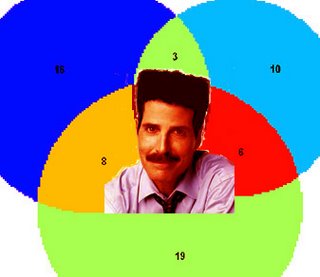One down...

"It was only out of concern that he might create an army of implacable and powerful enemies...that he did not fearlessly publish [his work]."
Jorge Luis Borges. 1949. The Aleph.
"Come get some."
Ash. 1992. Army of Darkness.
Wow.Exactly one year ago, the first of now 80-some posts was shot undaunted and unheralded from this weblog into the ether. I know, I know: the world has been so irreversibly altered by it that you can scarcely conceive of life without it. Neither can I. (What did I do with all the impishness and indignation before?)It started with such promise. I'm sure I've failed every challenge and broken every stricture I set before myself in that manifesto. The struggles of writing with no deadline and no audience...
Just wait 'til I get fired for blogging. Then it will all have been worth it.
Dumbwaiter to Heaven
 Wait a second.All we have to do is extrude a carbon nanotube filament and hang it on a geostationary satellite and POOF--space, the banal frontier: anyone who can climb is an astronaut?Then where is friggin' Richard Branson with his checkbook? You'd think, with the hots he has for space tourism, he'd be all over anything that gets paying customers high.Why am I suspicious that a technology this safe, cost-effective, and eminently feasible is gonna have to struggle for decades more against big rockets that go boom?Is it just not sexy enough? 'Cause that's what it sounds like when you start rhapsodizing about the "majesty" or "inspiration" of rocket-fueled space flight. It's the same argument behind diverting money from cheap and productive robotic exploration of the solar system to slinging messy, resource-hogging humans into the void.Rockets: sexyRopes: kinky, but not sexyWhat's so sexy about liquid oxygen? Are you willing to keep risking life and limb on 1950s technology because it happens to be around and it still looks kinda cool?How do we market something like this in a way that neutralizes the "magic beanstalk" factor? What if I told you it's laser-powered?Yeah, that'll go over like the proverbial lead zeppelin.
Wait a second.All we have to do is extrude a carbon nanotube filament and hang it on a geostationary satellite and POOF--space, the banal frontier: anyone who can climb is an astronaut?Then where is friggin' Richard Branson with his checkbook? You'd think, with the hots he has for space tourism, he'd be all over anything that gets paying customers high.Why am I suspicious that a technology this safe, cost-effective, and eminently feasible is gonna have to struggle for decades more against big rockets that go boom?Is it just not sexy enough? 'Cause that's what it sounds like when you start rhapsodizing about the "majesty" or "inspiration" of rocket-fueled space flight. It's the same argument behind diverting money from cheap and productive robotic exploration of the solar system to slinging messy, resource-hogging humans into the void.Rockets: sexyRopes: kinky, but not sexyWhat's so sexy about liquid oxygen? Are you willing to keep risking life and limb on 1950s technology because it happens to be around and it still looks kinda cool?How do we market something like this in a way that neutralizes the "magic beanstalk" factor? What if I told you it's laser-powered?Yeah, that'll go over like the proverbial lead zeppelin.
Race bait and switch
 Ick. I have the feeling I've been Stosseled (Stossellized? Stossellated?)You know, that nausea that results from having a know-it-all tell it like it is, because you're too chicken to face it...only to realize, after the orgiastic busting of threadbare myths, burning of straw men, and irate swishing of mustaches, that it was never questioned.Last Friday's 20/20, in its new incarnation as a single-issue muckracking newsmag, was an overly hyped examination of the taboos preventing honest dialogue about race and sex. The treatment turned out to be rather toothless, yet still pretty offensive.What offended me was a complex of unchallenged assumptions structuring, and effectively obstructing, the examination:
Ick. I have the feeling I've been Stosseled (Stossellized? Stossellated?)You know, that nausea that results from having a know-it-all tell it like it is, because you're too chicken to face it...only to realize, after the orgiastic busting of threadbare myths, burning of straw men, and irate swishing of mustaches, that it was never questioned.Last Friday's 20/20, in its new incarnation as a single-issue muckracking newsmag, was an overly hyped examination of the taboos preventing honest dialogue about race and sex. The treatment turned out to be rather toothless, yet still pretty offensive.What offended me was a complex of unchallenged assumptions structuring, and effectively obstructing, the examination: - there are groupings of people called "races," which exist at the same ontological level as genes;
- there is basically one factor to which everything can be (and should be--there's always slippage from one to the other) boiled down or bottom-lined; and
- there is a direct, unambiguous cause-effect relationship accounting for everything.
The most supposedly explosive topic was accounting for the over-representation of blacks in many sports. Sportswriter John Entine was enrolled to broach the genetic or physiological argument: blacks have an advantageous physique for running/jumping. (Take note that no one went anywhere near hockey, where leg strength is also crucial. Maybe because under-representation in hockey might make a genetic argument untenable.)Well-intentioned liberal contrarians were then brought on-screen to insist that necessity was the mother of competitive advantage: the black American underclass, and maybe even impoverished East African marathoners, have few viable options but sports, whereas whites have so many they can afford to be embarassed on hardcourt, track, gridiron, etc. (Was the phrase "institutional racism" ever uttered? Certainly not; we can't be too offensive in our finger-pointing.)Even the nice Iowan teacher who built her career taking elementary schoolers to the brink of racism and back - valiantly nipping prejudice in the bud by making kids experience both sides of it - was enlisted to suggest stereotypes and their deleterious effects on self-image are what guarantees some people finish last. (Get it? "Race"? Running? It's polysemic. Don't get distracted.)The elephant in the room is not that there might be a significant physiological component to success in certain prestigious/lucrative physical activities. The shock! What no one seems willing to address is how, the closer you look into race, the less certain you can be that anything is really there. Race is a fact, but a social fact: an ensemble of mental categories, social relations, and cultural practices that varies across cultures and historical eras. That it remains so important for people as a way of bringing order to their world does not make it biologically grounded. Phenotypic traits (how certain genes get expressed while others get suppressed) just don't match up to psycho-cultural traits in any direct or statistically significant way, conventional wisdom and J. Phillippe Rushton be damned. Populations of people are not bounded, no matter how subtle your criteria. Seizing on one or a handful of heritable traits - fast-twitch muscle fiber, for example - will never provide enough grounds for us to group humans into discrete races, nor will any set of behaviors or widespread prejudices.So fixating on one key variable for explaining complex phenomena, especially a factor as brittle as race, means you'll be constantly fighting a rear-guard action against a horde of pesky qualifications and exceptions summoned up by contact with the real world. A holistic, context-sensitive approach would factor all of the aforementioned variables together, the sum of their interactions generating results quite distinct from them individually and not reducible to them. It's the interplay of the factors, not the simple presence of one or all.Rather than seek any single point representing The True Cause of "Black" Dominance in Sports, think of a set of overlapping circles, each gradually lighter at its edges. One is a cluster of anatomical traits (which do not even partly co-map to any "African American" population), another America's social hierarchies, a third our systems of values and customs, a fourth the globally interconnected marketplace of goods and ideas, and so on, each considered in its historical contingency. Those individuals who fall in the zone of greatest overlap of factors have the greatest probability (nothing automatic about it) of succeeding in sports. Probabilities of success decrease as the overlaps decrease--that is, fewer beneficial traits are interacting. No single factor is a necessary or even sufficient cause to which we can ascribe any individual's fortunes. (Entine made this same probabilistic point, to his credit, by noting that physical gifts have no bearing if they are not harnessed by hard work.) Unless you think humans act strictly according to some genetic or cultural programming. If you do, I can guarantee they will continue to surprise you.The bottom line, you ask? How about two: - Putting up with a little complexity can produce a whole lot of insight, especially where an excessive reductionism obscures so much.
- As long as it's easier and more profitable to avoid overturning a pernicious social arrangement like racism, ain't a damn thing gonna change.
Therefore be warned:If you're gonna traffic in truisms and monocausal crypto-theories, be prepared for your reductionist ass to get skewered by uppity academics like me. We won't be confined to diploma factories, catering to your children and our society's out-of-whack priorities. We're retaking explanatory dominion over the real world, swinging the mighty pen, piling high the bloated carcasses of pundit after pundit.Word to yer mom, Stossel.
Ad majoram hysteriam mundi
For what it's worth
 I had wanted to make a statement regarding today's observance of the 2001 terrorist attacks. Something substantial, maybe even eloquent. Something to cut through the ebbing jumble of sentiment and what has passed for public introspection.Those words haven't yet come to me. But I can't get rid of the impulse to write. Or the irritating kernel of an idea.As much as we want to memorialize 9/11/01, we can't lose sight of 4/19/95.It's not so much the eerie parallels--each the biggest attack to that point, each subsequent investigation characterized by nagging loose ends affording the conspiracy-minded ample material. They're too different in scale and scope to be lumped together.Rather, it's the suspicion that, as much as we are supposed to have adjusted our lives to the new realities ushered in by 9/11, I think we have yet to really absorb the lessons of the Oklahoma City bombing.Chief among them is that, if we are to win a war against something as abstract as "terror," we can't assume it is the sole property or activity of some evil Other, lurking out there (or in here) somewhere. We had better be prepared to face terror and terrorism, not simply in our midst, but among our kind, in ourselves.
I had wanted to make a statement regarding today's observance of the 2001 terrorist attacks. Something substantial, maybe even eloquent. Something to cut through the ebbing jumble of sentiment and what has passed for public introspection.Those words haven't yet come to me. But I can't get rid of the impulse to write. Or the irritating kernel of an idea.As much as we want to memorialize 9/11/01, we can't lose sight of 4/19/95.It's not so much the eerie parallels--each the biggest attack to that point, each subsequent investigation characterized by nagging loose ends affording the conspiracy-minded ample material. They're too different in scale and scope to be lumped together.Rather, it's the suspicion that, as much as we are supposed to have adjusted our lives to the new realities ushered in by 9/11, I think we have yet to really absorb the lessons of the Oklahoma City bombing.Chief among them is that, if we are to win a war against something as abstract as "terror," we can't assume it is the sole property or activity of some evil Other, lurking out there (or in here) somewhere. We had better be prepared to face terror and terrorism, not simply in our midst, but among our kind, in ourselves.
Race to the Finish
 Survivor: Cook Islands is about to reach the air, but it has already been the object of intense gossiping. (Still no such thing as bad publicity.) In late August word spread like the wildfire that contestants would begin the competition divvied up by race.I think.If this article in the Calgary Sun is any indication, the host himself is less than clear on the criteria for team membership:
Survivor: Cook Islands is about to reach the air, but it has already been the object of intense gossiping. (Still no such thing as bad publicity.) In late August word spread like the wildfire that contestants would begin the competition divvied up by race.I think.If this article in the Calgary Sun is any indication, the host himself is less than clear on the criteria for team membership:"[Probst:] 'Ultimately, to win this game, you’re voting people out that are then on the jury that have to come back and vote for you. So, the person who wins is actually going to do the best job of merging with all different ethnicities.'"
He even throws off the staff writer trying to make sense of the whole mess:"Probst says dividing the tribes by race is not meant to promote segregation, but to encourage the different cultures to mix."
Evidently we media consumers are to assume all those categories are synonymous or linked in some direct and unproblematic way. Or perhaps we should just assume that they are as far as journalists and game show hosts are concerned. Either way it ain't pretty.Not to set myself up as social-theory cop, but this kind of terminological messiness does a disservice to anyone who wants to figure out what Survivor 13 might mean for the pop cultural world we inhabit. I'm pretty sure this would include many viewers of the show.
For instance, why do European-Americans consistently form the largest and most eager segment of the applicant pool--so much so that producers had to go out of their way to find nonwhites? Do you want to stick with the hack stand-up shibboleths about [insert group here]? Or do you want the chance for some deeper insight?
Well, treating race, culture, and ethnicity as interchangeable doesn't help. Nor does using phenotypic differences (which don't cluster into distinct races) as proxies for culturally-based groupings like ethnicity. Nor does assuming that differences in appearance or self-identification are the most salient factors, especially considering the majority of this season's contestants come from California.
I'd encourage you to look for editorial enlightening from my anthropological colleagues. However, as of this writing, no one has stepped up to that plate. Maybe the October edition of Anthropology News will feature some commentary. I fear that, even if anthropologists articulate a disciplinary position clearly or provide really thoughtful analysis, it's going to follow the way of all anthro-apology and diffuse out into the ether with no discernible impact. Until we can infiltrate soundstages and scriptwriting sessions - there's some applied anthropology! - we're just not going to make any difference, positive or otherwise.
What Survivor's competitors need is native peoples from their filming locations to show up and bust some knowledge upside their heads--like about what it means to be racialized, ethnicized, acculturated, marginalized, and otherwise buffeted by colonial governments and the mass culture industry. In this case the lesson should be delivered at the end of a spear by a cadre of grimacing, menacing Maori warriors. Aaaaaaaarrrrrgggghhhh!!!!
Plutocracy
 I was going to submit this post weeks ago, when things seemed more settled. I was going to crow that it's official: Tombaugh be damned, Pluto is out on its cold, rocky butt, its reign of error in the Kuiper Belt reduced to lordship over the "dwarf planets."But I'm glad I held off. Things have gotten wierder.
I was going to submit this post weeks ago, when things seemed more settled. I was going to crow that it's official: Tombaugh be damned, Pluto is out on its cold, rocky butt, its reign of error in the Kuiper Belt reduced to lordship over the "dwarf planets."But I'm glad I held off. Things have gotten wierder.
Where to begin? How about a very fine commentary in the Planetary Society website on the insider haggling over how to define a planet. I second the commentator on how the debate provides a great opportunity to see one segment of the scientific community in action. Science, in this salutary view, is less about establishing truth for all time than constantly, self-critically struggling to know more and better, to get closer to the truth.
I would go even further. The Pluto/planet controversy is also a great venue for presenting science studies--a self-reflexive attempt to understand Science as a situated human endeavor--to nonexperts. The controversy is important independent of the quality of the scientific work informing any resulting definition. It provides a view of and a way in to science for nonscientists.
It's far from a bad thing for nonexperts to witness the messiness of actual scientists' practice, which was a fear of some astronomers in re: Pluto. The personal stakes in impersonal data and hypotheses. The rounds of consensus-building, even voting. The personification of the ex(?)-planet and how "he" might feel about losing "his" status. And, now, an uprising of disenfranchised planetologists with a competing definition. (See the text of the definition yourself, though don't be shocked if the experts don't crowd around to hear your assessment of their work.)
The Pluto battle also provides us a valuable lesson on how experts and nonexperts relate so differently to scientific knowledge, always vulnerable to revision or deletion, never free from the inertia of the paradigm or the tug of "external" cultural and economic forces. A self-identified nonexpert "Pluto fan" put it quite reasonably in a NY Times interview:
“It’s just the natural progression of things...The more you learn, the more assumptions are going to get turned upside down. It’s just part of science. And life.”
It's been fascinating to hear, in piecemeal but evocative fashion, how the wider public reaction to the expert debate and its outward-rippling concomittants is reported/shaped by the popular science press. "Honk if Pluto is a planet" bumper stickers and laments that "we have to change the textbooks" (no small practical and financial matter, it should be noted) show how a minor celestial cousin nevertheless connects to a web of symbolic and material significance for many humans that will surely respond if tugged.
I'm with the astrologers on this one...or at least one who deigned to be consulted by a member of the press corps. It doesn't mean dick to the cosmos how we think of it. We didn't know Pluto was there before 1930, we debated it for decades afterwards, and have only ourselves to blame for working it so cozily into our mental maps that it disturbs us to refile it.
Meanwhile, he just keeps loitering out there. Waiting. Plotting.
Wal-Martyrdom
 God bless Charlie Rose. He gets some of the most interesting people, under the admittedly weak spotlight of public TV, to talk about some really vital subjects with no interruptions.
God bless Charlie Rose. He gets some of the most interesting people, under the admittedly weak spotlight of public TV, to talk about some really vital subjects with no interruptions.
Mr. Rose hosted the CEO of Wal-Mart for a whole hour recently, both at his studio table and wandering around a North Jersey store letting customers grill him. (That's him, if you're wondering. Lee Scott.) Apparently he's making noise about changes in company policy--toward kinder, gentler, "employee health care, blah blah, encouraging our small competitors, blah blah."
Scott came off as a smart, smooth, candid-sounding exec, maybe taking a cue from Jim Sinegal, who runs CostCo from a cubicle, shuns titles, caps his own salary, and seems to be succeeding by treating his workforce admirably.
But he offered too much protestation, methinks. He had to spoil the good feelings by whining about how Wal-Mart's "only 10% of total sales in the US market, but we're still an easy target for critics. Is this not the same company whose lawyers danced around a "big box" law in MD by building two adjacent stores, each just under the square footage limit, that together dwarfed their competitors and flouted local governmental control? The same company for whom Chicago's City Council designed such a blunt legal instrument that it's beating back Wal-Mart and its competitors?
What intrigued me was when the conversation turned to how several business magazines have featured Scott as a potential white knight for green commerce. There is something in this, given the economy of scale involved. I'm enjoying the potentially juicy irony of the world's largest retailer leading a shift to an environmentally responsible business model - energy-efficient stores, leverage over suppliers on better packaging, bringing in Al Gore to lecture his managerial team, maybe even switching the truck fleet to biodiesel on the horizon - simply because it's getting too expensive not to.
Almost makes you forget that Wal-Mart is arguably the single biggest player in bringing more people worldwide into a pattern of mass production and consumerism - founded on artificially cheap labor, cheap goods, and over-extended, energy-draining supply chains - that is neither economically nor ecologically sustainable even in the medium term.
So does making customers and shareholders (and potentially even the planet, however you want to anthropomorphize it) happy make up for the resource-draining behavior you're encouraging?









